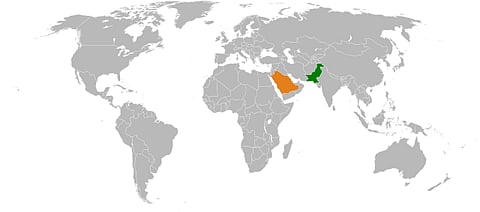

Pakistan and Saudi Arabia are significantly deepening their longstanding strategic partnership, with recent high-level military engagements reinforcing a landmark defense pact that binds their security destinies together. This evolving alliance, which combines Pakistan's military capabilities with Saudi economic strength, is poised to substantially enhance regional security cooperation.
The commitment to deepen ties was reaffirmed during a recent meeting in Saudi Arabia between General Sahir Shamshad Mirza, Chairman of Pakistan's Joint Chiefs of Staff Committee, and General Fayyadh bin Hamed Al-Ruwaili, Chief of the General Staff of the Saudi Armed Forces. In recognition of his pivotal role in strengthening the bilateral relationship, particularly in military cooperation, General Mirza was honored with the "King Abdulaziz Medal of Honour of the Excellent Class". The Saudi military leadership specifically commended the professionalism of the Pakistan Armed Forces and acknowledged their sacrifices in the fight against terrorism.
This high-level engagement builds upon the Strategic Mutual Defense Agreement signed on September 17, 2025. This pact is a formal and comprehensive document that declares any act of aggression against either nation will be considered an attack on both. A senior Saudi official clarified that the agreement "encompasses all military means," signaling the depth of the commitment. The signing ceremony, attended by Pakistani Prime Minister Shehbaz Sharif and Saudi Crown Prince Mohammed bin Salman, was characterized as a culmination of years of discussions, institutionalizing a decades-long security partnership.
The strategic partnership is underpinned by substantial Saudi economic support, which is crucial for Pakistan's stability. In a significant move, Saudi Arabia has pledged a $1 billion oil financing facility for Pakistan for the 2025-26 fiscal year and has rolled over $5 billion in existing deposits with the State Bank of Pakistan. This financial assistance helps Pakistan meet its energy import requirements and reduces pressure on its foreign reserves. This economic cooperation extends to Saudi investments in major projects, including a $6 billion brownfield refinery and potential involvement in the Reko Diq mining project.
The new pact formalizes a deep and historical military cooperation that dates back to the 1960s. This relationship has included Pakistan training over 8,200 Saudi armed forces personnel since 1967, the two countries holding several joint military exercises, and Pakistani troops being stationed in Saudi Arabia in training and advisory roles under a 1982 protocol. In 2017, Pakistan's former army chief, General Raheel Sharif, took command of the Saudi-led Islamic Military Counter Terrorism Coalition, demonstrating the trust Riyadh places in Pakistan's military leadership.
This enhanced alliance offers Pakistan significant strategic advantages, elevating its role as a key security actor and an emerging middle power. The pact is seen as a major diplomatic achievement that strengthens Pakistan's position and provides a strategic deterrent. Pakistani officials have expressed openness to other Gulf nations joining the agreement in the future, with Foreign Minister Ishaq Dar supporting the concept of a joint Arab security force and noting that the pact with Saudi Arabia could eventually develop into an "Eastern NATO". For Saudi Arabia, the partnership is a key part of its strategy to diversify its foreign policy and ensure regional stability, which is crucial for the success of its Vision 2030 economic transformation plan.